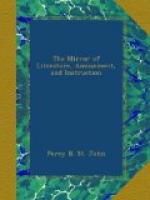“One morning, M. Henri was obliged to go out. Beaumont, sure that he would not return that day, ran to his house, put on a black coat, and in that costume, which, in those days, always announced a magistrate, or public functionary, presents himself at the entrance of the Bureau Central. The officer to whom he addressed himself supposed, of course, that he was at least a commissary. On the invitation of Beaumont, he gave him a soldier, whom he placed as sentinel at the entrance to the narrow passage which leads to the depot, and commanded not to allow any person to pass. No better expedient could be found for preventing surprise. Thus Beaumont, in the midst of a crowd of valuable objects, could, at his leisure, and in perfect security, choose what best pleased him; watches, jewels, diamonds, precious stones, &c. He chose those which he deemed most valuable, most portable, and as soon as he had made his selection, he dismissed the sentinel, and disappeared.”
“This robbery could not be long concealed, and the following day was discovered. Had thunder fallen on the police, they would have been less astonished than at this event. To penetrate to the very sanctuary!—the holy of holies! The fact appeared so very extraordinary, that it was doubted. Yet it was evident that a robbery had taken place, and to whom was it to be attributed? All the suspicions fell on the clerks; sometimes on one, sometimes on another; when Beaumont, betrayed by a friend, was apprehended, and sentenced a second time.”
“The robbery he had committed might be estimated at some hundred thousand francs, the greater part of which were found on him.”
“‘There was wherewithal,’ he said, ’to become an honest man; I should have become so; it is so easy when rich! yet how many rich men are only scoundrels!’”
“These words were the only ones he uttered, when he was apprehended. This surprising thief was conducted to Brest; where, after half a dozen escapes, which only served to make his subsequent confinement more rigorous, he died in a frightful state of exhaustion.”
“Beaumont enjoyed amongst his confraternity a colossal reputation; and even now, when a rogue boasts of his lofty exploits—’Hold your tongue,’ they say, ‘you are not worthy to untie the shoe-strings of Beaumont!’”
“In effect, to have robbed the police was the height of address. Is not a robbery of this nature the chef-d’oeuvre of its kind, and can it do otherwise than, make its perpetrator a hero in the eyes of his admirers? Who should dare to compare with him? Beaumont had robbed the police! Hang yourself, brave Crillon! hang yourself, Coignard! hang yourself, Pertruisard! hang yourself, Callet!—to him, you are but of Saint-Jean. What is it to have robbed states of service? To have carried off the treasure of the army of the Rhine? To have carried off the military chest?—Beaumont had robbed the police! Hang yourselves!—or go to England, they will hang you there.”




